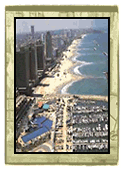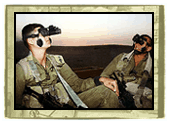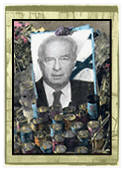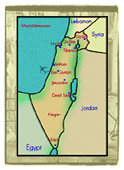 |
 |
 |
|
|||

An American Jew in Israel The first time you travel together as a couple, you learn a lot. You learn, for instance, that it's hard to feel close when you spend every single minute with two other people, as Adam and I ended up doing. You also learn that nothing kills romance like both reporting the same story. So Adam and I have decided I'll tell it.
That's Adam. He can't sleep. The guy behind Adam keeps kicking Adam's chair, and when he asked the guy to stop, the guy said, listen, there's not enough room back here. So I'm gonna kick. The whole conversation took place in Hebrew. Adam shrugs. Typical Israeli. This flight, and the interaction with this guy, is in some ways a perfect metaphor for Adam's life. His life is a never-ending flight between America and Israel and his life is also an ongoing fight with Israel. Adam's mother is Israeli and he spent pretty much every summer there during his childhood.
Until Adam was about 20, he thought he'd eventually move to Israel -- for good. Make aliyah, as they say in Hebrew, which means "to ascend." But he doesn't want to anymore and he's not sure why. The last few times he's been back, Israel hasn't felt like home the way it used to. But it's like an old lover he just can't forget. He still adores it, is still a bit obsessed with it, even though he sometimes sees the whole country as variations on this guy on the plane: blunt, bordering on rude, always ready to fight. Even Israelis say they fight a lot -- you'll hear them say, thank God for the Arabs, otherwise we'd kill each other. I'm not Jewish, which has never been an issue between Adam and me, but he does want me to see Israel, to understand why he can't live there and yet can't stay away. He wants to be able to turn to me and say, "See? see what I mean?" I don't know if I will see what he means. I'm just here to keep my eyes open and see whatever I see. Okay, now since airlines won't let us record take-offs or landings, you'll have to imagine that we've just landed in Israel and we're on our way to Tel Aviv, Israel's version of New York.

That's Boaz, our guide. Besides this being Adam's and my first time traveling together, it's also our first time on a guided tour of anyplace. The Israeli Ministry of Tourism is paying for the trip, because we told them we wanted to do a story about Israel. They're thrilled, needless to say, and we feel sort of queasy, as you do when someone else is paying your way. But we're resigned to the fact that we're writers, not Steve Forbes. We couldn't have afforded to do this story any other way.
Boaz is tall, tan, has short dark hair, and wears sunglasses like Will Smith in "Men in Black." He will be with us, every day, all day, for the next week. Besides Boaz we also have a driver, Nissim, who is so microphone-phobic that when I ask him questions, he not only pretends that he doesn't speak English -- even though he speaks it fine when the mike is off -- but also he pretends that he only speaks Spanish. He has an entire persona developed to avoid being recorded. The plan, for the week, is to see almost the entire country. This is actually possible because Israel is approximately the size of New Jersey. Also, because Israel is only 50 years old, Boaz, who's 40, has lived through most of the history of the state. He's a sabra, which means he was born here, and historical events like the Six Day War, in 1967, and the intifada, in the late 1980s, are ones he lived through. He fought in Israel's ongoing war in Lebanon, and it actually led him, indirectly, to becoming a guide.
As Boaz is talking -- he's in the front passenger seat and Adam and I are in back -- I notice as he gestures, that the forefinger on his left hand is missing. When he points at something, he uses the middle finger of his left hand. It looks like an old injury, something he's completely used to, but I can't stop looking at it.

Do you hear how matter-of-factly he's saying the words "something was exploded next to me"? Army service is compulsory in Israel, although it's getting easier for girls to get out of it if they want to. But boys all serve slightly less than three years between high school and college. While we're driving to Tel Aviv, it's easy to forget that Israel, even during its current peace talks, is a country at war pretty much all the time. Tel Aviv is a thriving, modern city: skyscrapers, apartment buildings, teenagers. No one looks like they're about to head off to a bomb shelter or put on a gas mask. But almost every adult that you see on the street has served in the military, and everyone younger than that knows that they're going to serve. Every single person is intimately connected to the defense of the state. A lot of Americans are afraid to travel to Israel. It's in the Middle East, it's a small country surrounded by more-or-less hostile neighbors. But that's a misguided fear, like being afraid of flying. You're vastly more at risk driving to work every day than you are flying to Israel and walking around for a week. According to the Israeli government, the last time a tourist was killed in a terrorist incident in Israel was in 1991. Meanwhile, during the week Adam and I are about to spend there, seven people died in car crashes in our hometown of Chicago. Violence in Israel today doesn't happen very often, and when it does, Israelis are more at risk than tourists. Adam and I walk around Tel Aviv after we get to the hotel, watching evening come to the city. Without meaning to, we find ourselves suddenly at the exact site where Prime Minister Yitzhak Rabin was assassinated. It's a completely mundane city block, next to a parking garage in the middle of down town, across from a photo shop and a big ad for ice cream. Adam was visiting Israel the week Rabin was killed.
There's a memorial here now, a 15-foot square recessed into the sidewalk and filled with rough boulders and an eerie light shining up through them. It's hypnotizing, as though the Earth itself has ruptured here.

This is Adam's grandmother, Judy. We're in her apartment looking through a scrapbook and she's come across a picture of Yitzhak Rabin's father. He and Judy's father were members of the same Labor Zionist movement in the U.S. in the early 1900s. That movement, called Poale Zion, essentially created Israel. That's why Israel today -- as I'm finding out, to my surprise -- is such a secular country. The leaders of Poale Zion, even though they were all Jews, were much more committed to socialism than to Judaism. They were intellectuals; they wanted to escape anti-Semitism and create a Jewish homeland, but not a religious one. What they really wanted was a place where they could be Jewish without having to think about it all the time, without worrying about it.
To appreciate this story you need to know two things: first, the Labor Zionists in the U.S. were a small group and everybody knew each other. Second, Judy is an inveterate name-dropper.
Judy is the first person Adam wanted to visit after we landed. She's 89 and getting more frail by the minute. Her eyesight is almost gone and she's started using a walker to get around. But the greatest loss is her memory. She's slowly losing her stories. Adam knows them all by heart; they're half the reason he fell in love with Israel. In fact, her Zionism influenced him to such an extent, that when he was growing up, his view of Israel was essentially that of an early 20th century Zionist: a person seeing only the ideals and potential of a country yet to be created. That view, of course, became complicated by the actual country he ended up visiting his whole life, but even his disillusionment with Israel reflects the time line of Judy's life almost as much as that of his own. He's painfully aware that the country has become much more right-wing since its socialist origins and that religious Israelis have gained a lot of political power, far more than the Christian Right has in the U.S., and they want the country to be a religious state. And old lefties like Judy, as well as young ones like Adam, are embarrassed and angered by Israel's treatment of Palestinians in the West Bank. I've always thought of America as the poster-country for nations that started with great ideals and are continually struggling -- and often failing -- to live up to them. But for Adam, Israel has always been his country of ideals. And what I'm beginning to realize on this trip is that Adam takes Israel's failures much more personally than I've ever taken America's.
|
 | American Public Media Home | Search | How to Listen ©2004 American Public Media | Terms of Use | Privacy Policy |
